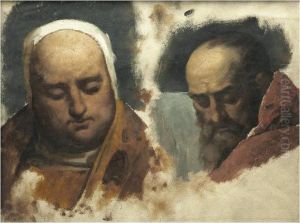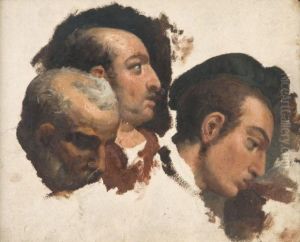Eloi Firmin Feron Paintings
Eloi Firmin Feron was a notable 19th-century French artist, born in 1802 in Paris, France, and passing away in 1876. His life and career were deeply embedded in the rich artistic milieu of Paris, a city that was, during his lifetime, the epicenter of European art and culture. Feron was educated at the prestigious École des Beaux-Arts in Paris, where he honed his skills under the tutelage of some of the era's most esteemed artists. This education provided him with a solid foundation in the traditional techniques of painting and drawing, which he would later expand upon in his professional work.
Feron's body of work is characterized by its diversity, encompassing portraiture, historical scenes, and religious subjects. He was particularly noted for his skill in capturing the human form, imbuing his subjects with a sense of realism and emotional depth that was highly prized by his contemporaries. Despite the prominence of Romanticism during his early years, Feron managed to carve out a unique stylistic niche for himself that straddled the line between the dramatic flair of Romanticism and the emerging sensibilities of Realism.
Throughout his career, Feron exhibited his work at the Paris Salon, the official art exhibition of the Académie des Beaux-Arts in Paris. His participation in these exhibitions not only helped to establish his reputation among the French art community but also provided him with opportunities to engage with a wider audience, including patrons and other artists. Feron's contributions to the French art scene were recognized with several awards and honors, reflecting his status as a respected member of the artistic community.
Despite his success, Eloi Firmin Feron's work has not achieved the same level of recognition in the modern era as some of his contemporaries. Nonetheless, his contributions to 19th-century French art remain significant. His paintings continue to be appreciated for their technical skill and emotional resonance, offering insights into the aesthetic preferences and cultural values of his time. Feron's legacy is preserved in the collections of several French museums, where his works continue to be studied and admired by art enthusiasts and historians alike.


